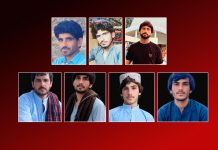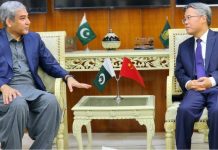Press Clubs Echoed
By Banul Baloch
In the revolutionary history, many leaders had risen up to struggle for the existence of their culture, language, and sovereignty of their nation, and such leaders remained the main figures of the revolutions. They have remained main factors of political change, religious promotion and production of economic ideologies in the world.
Oppressed nations have always paid a huge price to gain prosperity. In the struggle to get their rights, the subjugated nations have given sacrifices of their entire life doing struggle and facing the.
Every occupier has adopted torture to crush the voice of the oppressed. They have used tactics such as killing, illegal detention and enforced disappearance of the political leaders, political activists, students and people from all walks of life the oppressed nations. The living nations always remember the paid sacrifices of their national heroes who lived and died for the nation.
The history of the world has shown us examples of such folk heroes in the form of various leaders who led different movements. Those movements resulted in complete collapse of entire oppressor regimes, and such movement of the people helped emerge independent nations who had the power to decide for the present and future of their nation themselves.
Dr. Che Guevara, a major figure of the Cuban Revolution, was executed on October 9, 1967, and till today he is remembered, mourned, and celebrated in Cuba. Today he is an example for every oppressed nation who is chained in slavery shackles and is struggling to break these chains.
Nelson Mandela was a South African Anti-Apartheid revolutionary leader who served 27 years in prison.
Bhagat Singh, leader of the Indian Socialist Revolution, was the folk hero of Indian independence movement. He was executed on March 23, 1931.
Martin Luthar King, an American Baptist minister and activist, was the most visible leader in the civil rights movement from 1954 to 1968, and he was executed on April 4, 1968.
Fidel Castro, the great Cuban communist revolutionary leader and politician, governed the Republic of Cuba.
If we have a look on Baloch national struggle for liberation of Balochistan, then we will also get to see many prominent leaders who struggled and are still struggling for a free Balochistan (which was forcibly occupied on March 27, 1948). Since 1948 many leaders have risen to resist the slavery.
Aga Kareem khan, Nawab Noroz khan, Yousuf Aziz Magsi, Nawab Akbar Khan Bugti, Ghulam Muhammad Baloch, Fida Baloch, Raza Baloch and hundred others have sacrificed their lives for their nation; for a free Balochistan.
But the under-study piece is on the former Chairman of Baloch student Organization Azad, Zahid Baloch; one of those great leaders of the free Balochistan struggle. Zahid Baloch is a resident of Naal Khuzdar, Balochistan. He was elected as the chairman at BSO-Azad’s 19th National Council Session, which was held on June 26, 2012.
Zahid Baloch is an irenic political leader who struggled for maintaining peace and the removal of unjust system. He is a man with strong ideology who had stern enlightened policies for his organization. He worked to educate Baloch Students politically, he was spreading knowledge among Baloch students and delivered awareness lectures and study circles to Baloch youth against slavery in every nook and corner of Balochistan. He was striving to break the chains of slavery. He was one of those leaders who brought drastic, sudden but positive changes for his organization and the nation as a whole. He served his many efforts and contribution towards the vision for an independent Balochistan.
State has always been terrified from power of such visionary leaders. The state disappears such leaders and dump their mutilated bodies in order to end their struggle and to weaken their organization.
Chairman Zahid was forcibly disappeared on March 18, 2014 from Quetta, Balochistan, while he was in the city on organizational engagements. He was intercommunicating with Baloch students to raise awareness for a free Balochistan while Kill-and-Dump policy was in full swing in Balochistan.
Four rough years of Zahid’s abduction have completed. During these four years, BSO-Azad has organised many campaigns, press conferences, demonstrations, and rallies against the enforced disappearance of Chairman Zahid. These protests have been held in front of Karachi, Quetta and Islamabad press clubs, and in foreign countries too. Press clubs have echoed time and again with slogans like: ‘Save BSO Azad Leaders’ and ‘Save Zahid Baloch’.
Lateef Johar Baloch, the former Central Committee Member BSO Azad, sat unto death hunger strike on April 22, 2014 for the safe recovery of Chairman Zahid. His strike lasted for 46 days. Due to Lateef’s deteriorating health, the human rights organizations forced BSO-Azad to end the hunger strike, and one of them assured BSO-Azad for the safe release of Chairman Zahid Baloch by pressing Pakistan. But up till now Chairman Zahid’s whereabouts are unknown. Zahid Baloch is facing worst torture in the secret detention centres of Pakistan.
State has since continued to apply its monstrous policies on student leaders. After illegal detention of Zahid Baloch, state forcibly disappeared Information Secretary of BSO Azad, Shabir Baloch aka Lakmeer. Many other leaders of BSO-Azad have been forcibly disappeared in past too and were executed; their mutilated bodies dumped in mountains or roadsides. This list includes Raza Jahangir Baloch, Qazi Baloch, Qambar Chakar Baloch, Sangat Sana, Ilyaz Nazar and many other BSO-Azad leaders who were killed for the sake of educating the youth of the Baloch nation politically.
Recently the General Secretary of BSO-Azad, Sanaullah Baloch, along with two Central Committee Members, Naseer Baloch and Hassam Baloch were also forcefully disappeared from Karachi on 15th November 2017. Zakir Majeed, leader of BSO-Azad, is missing since last 9 years.
The human history teaches that nations have lived forever when they haven’t hesitated to sacrifice lives for a prosperous future. The future where humanity is loved, culture is embraced, and language and civilization are the symbol of national pride.
We have to pay for such a future of an independent Balochistan. Therefore, we should be always ready to give sacrifices for such a noble cause; for whom thousands of Baloch political leaders, students leader, students and people from all walks of life have sacrificed their lives.






























